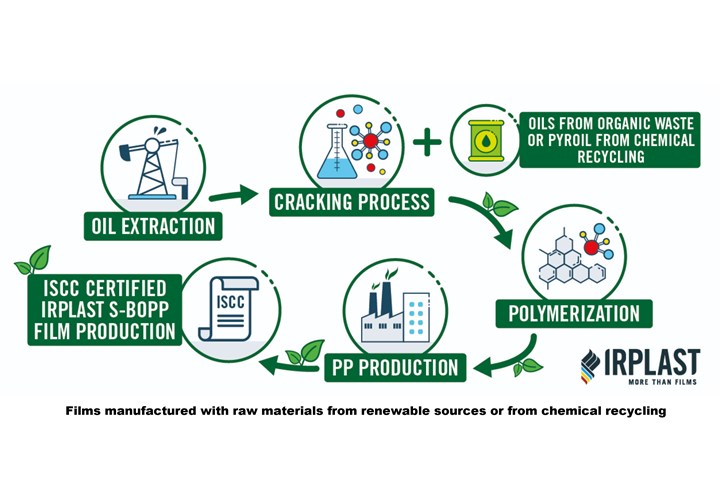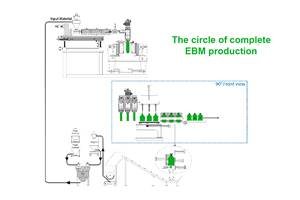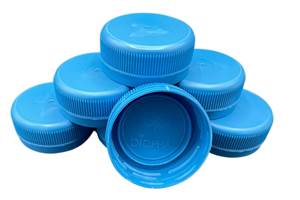S-BOPP Film Maker Opts to Use SABIC's Renewable PP
Irplast’s new NOPP (Natural BOPP) films are made with SABIC’s certified renewable PP derived from biobased feedstock.
Italy’s Irplast S.p.A., a global producer of simultaneously bi-oriented polypropylene film (S-BOPP) for the manufacture of printed adhesive tapes, wrap-around labels for the food, beverage dairy, personal & home care markets and also for multi-pack solutions, has selected certified circular and certified renewable PP from the Trucircle portfolio of SABIC (U.S. office in Houston) for its new S-BOPP film solutions.
Irplast, known for its advanced LISIM stretching technology applied to BOPP that is done in one-step vs. the standard two-step process, has always focused on sustainability with important investments to reduce thickness and to save raw materials and energy. The company’s new innovative and sustainable S-BOPP film portfolio received ISCC certification at the end of 2019, which guarantees the solidity of the chain of custody right through the life cycle, from raw material production to packaging supplies. This new generation of BOPP film include NOPP (Natural BOPP), which is made from certified renewable SABIC PP derived from biobased feedstock.

The resulting S-BOPP films reportedly comply with rigorous food contact regulations and are 100% recyclable in normal polyolefin waste separation streams. Said SABIC’s circular economy leader Mark Vester, “The materials from our Trucircle portfolio offer drop-in solutions and we are very happy to collaborate with Irplast and support them to deliver sustainable solutions to the packaging industry. With our certified circular and renewable polymers, we are aiming to create a value chain where SABIC and key downstream customers like Irplast collaborate to recycle mixed post-consumer plastic back to the original polymer for packaging or other applications, thereby enabling the circular reuse of the planet’s natural resources.”
SABIC’s certified renewable polymers reportedly are high-quality virgin polymers, based on second-generation, biobased feedstock. Like SABIC’s certified circular polymers, its certified renewable polymers have been accredited through the International Sustainability and Carbon Certification (ISCC PLUS). SABIC uses feedstock which is not in competition with the food chain and are not of animal origin, such as the waste vegetable oils, currently available as a recovered by-product of the responsibly managed forest industry. All the films in Irplast's S-BOPP portfolio are ISCC certified and are said to offer identical technical properties equivalent to standard versions, offering brand owners and packaging suppliers truly sustainable packaging solutions.
The other sustainable option being developed by Irrplast involves the manufacture of LOOPP films made from SABIC’s certified circular polymers that are made from recycling of low quality, mixed plastic waste otherwise destined for incineration or landfill. The resultant certified circular polymers reportedly are of equal quality to virgin polymers with outstanding mechanical, processing properties and purity. Said Irplast’s sustainability manager, “We firmly believe that sustainable growth must become a priority for 大象传媒es producing and converting plastic packaging materials. As a packaging producer, we are well aware of our responsibilities in making the 2030 Sustainable Development Goals a reality and we are very committed to the challenge. We have undertaken a gradual but determined path, consistent with the development of new materials according to the guidelines of the EU Packaging and Packaging Waste Directives. Therefore, we have brought out two new innovative product lines in collaboration with SABIC, one to reduce the carbon footprint of BOPP flexible packaging, while the other introduces the possibility of entering the circular economy, being progressively mandated by legislators worldwide.”
Related Content
Get Color Changes Right In Extrusion Blow Molding
Follow these best practices to minimize loss of time, material and labor during color changes in molding containers from bottles to jerrycans. The authors explore what this means for each step of the process, from raw-material infeed to handling and reprocessing tails and trim.
Read MorePHA Compound Molded into “World’s First” Biodegradable Bottle Closures
Beyond Plastic and partners have created a certified biodegradable PHA compound that can be injection molded into 38-mm closures in a sub 6-second cycle from a multicavity hot runner tool.
Read MoreBMW Group Vehicle to Adopt 3D Printed Center Console
A vehicle coming to market in 2027 will include a center console carrier manufactured through polymer robot-based large-format additive manufacturing (LFAM).
Read MoreMedical Tubing: Use Simulation to Troubleshoot, Optimize Processing & Dies
Extrusion simulations can be useful in anticipating issues and running “what-if” scenarios to size extruders and design dies for extrusion projects. It should be used at early stages of any project to avoid trial and error and remaking tooling.
Read MoreRead Next
Beyond Prototypes: 8 Ways the Plastics Industry Is Using 3D Printing
Plastics processors are finding applications for 3D printing around the plant and across the supply chain. Here are 8 examples to look for at NPE2024.
Read MoreSee Recyclers Close the Loop on Trade Show Production Scrap at NPE2024
A collaboration between show organizer PLASTICS, recycler CPR and size reduction experts WEIMA and Conair recovered and recycled all production scrap at NPE2024.
Read MoreFor PLASTICS' CEO Seaholm, NPE to Shine Light on Sustainability Successes
With advocacy, communication and sustainability as three main pillars, Seaholm leads a trade association to NPE that ‘is more active today than we have ever been.’
Read More













